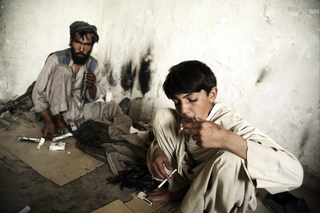By Steve Chao & Philip J. Victor
Afghanistan is in the grips of a drug epidemic that some say is far more dangerous than the Taliban. And those behind the trade remain defiant in the face of efforts to rid the country of their presence.
“They’ll never stop us. You see, we’ve tasted the profits, so we’ll never let go,” said one smuggler when asked whether the government would ever be able to stop the illegal business.
“Sometimes they try and raid us, but we have lots of drug labs and places to hide the goods. The border is also very porous, so there’s no way to stop the flow,” the smuggler told Al Jazeera’s “101 East.”
Afghanistan’s poppy fields now supply more than 90 percent of the world’s heroin, and authorities appear to be unable or, some suggest, unwilling to stop those behind the multibillion dollar trafficking industry. Cultivation of the narcotic hit record highs last year, according to U.N. figures.

Drug addicts in Afghanistan. (Photo: UNODC)
The resurgence in poppy production has wreaked havoc on the people of Afghanistan, where the number of drug addicts is estimated to be as high as 3 million. One of those addicts is Kabul resident Karim Kambari, who said he turned to drugs after being unable to find a job.
“After thinking, thinking, thinking, no place, no job, no money, I come here,” he said, referring to an area under a bridge where some of Kabul’s addicts make their home, alongside flowing sewage.
Deputy counternarcotics commander Nasrullah Khan, who for years was responsible for maintaining security on the highways and only recently was put in charge of tackling the country’s drug problem, said authorities feel outmatched and outgunned in their fight against drug lords and the Taliban.
"The last time we were here, IEDs were exploding around us, and we were constantly under fire. Many of my officers were injured or killed,” said Khan as he oversaw tractors tearing up of a poppy field in Kandahar province.
Because of such attacks, authorities said, police have been able to destroy only 9 hectares of an estimated 5,000 hectares of poppy fields in the area. He doesn’t blame farmers but the “drug mafia that forces people to grow illegal crops.” He said he believes that the criminals are winning.
“We police can win this war on drugs, but we need the government to fund these campaigns. If they’ll actually pay for the tractors, the personnel and the logistics, we can win, but it’s not happening,” he said.
While growing poppy for opium is illegal in Afghanistan, poppy farmers have largely ignored government warnings and continued cultivation, blaming years of war and instability and contending that only poppy production brings in any profits.
“To be honest, I would prefer to grow something else, but government officials haven’t helped us with alternatives. So what choice do I have?” asked poppy farmer Fazel Rehman. “Poppy guarantees cash in your hands. We make 10 times more with the drug than other crops. It means I don’t need to be in debt and can feed my family.”
Haroon Sherzad, Afghanistan’s acting minister of counternarcotics, has pushed hard to remind the national government of the need to keep the drug fight a priority. But when asked why drug production has continued to thrive in the country despite years of trying to crack down on it, he placed blame on the international community, saying it has largely ignored the problem.
“Their focus was only on terrorism … but counternarcotics was an isolated and marginalized agenda in their programs. This is the time that they realize that terrorism has been fueled and financed by the opium economy,” he said.
To that end, a high-level, unidentified drug smuggler who spoke to Al Jazeera said that even as authorities have undertaken efforts to police drug trafficking, smugglers have gotten the protection of the Taliban to carry out their trade in return for money.
“These guys never touch the stuff, but they do guard our poppy fields. In return, we pay them a tax of about 10 percent. If any police come, they’ll take them on,” said the smuggler. “If there is no Taliban, there would be no poppy.”



